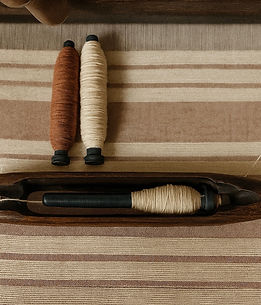Our Story
Women-Owned Local Business

A Story Woven in the Dust of Villages
Some brands are born in boardrooms. Ours began under the neem tree of a forgotten loom in Mallawan, a village that never made it to the map — but stitched its soul into cloth.
We are Hand and Loom, a slow-made rural based textile design studio led not by machines, but by mothers and weavers, by chai breaks and monsoon patience. In a world rushing fast, we chose to slow down — to listen to the rhythm of the charkha, to trust the touch of human hands, to craft textiles that feel like home because they come from one.
A Brand That Lives Where the Fabric is Born
Our artisans are not workers in a factory.
They are women who hum lullabies while stitching, men who learned to weave from their fathers, and young girls threading stories into fabric in between schoolbooks and evening chapatis.
Each cushion you touch, each fabric you unroll — carries the scent of rain-washed earth, the indigo of sky after harvest, and the softness of time well spent.
We work with heritage crafts that were almost silenced:
• Handspun khadi from Mallawan’s own spinning wheels
• Natural dyeing with turmeric, madder, pomegranate skin, and wild indigo
• Chikankari embroidery from Lucknow’s courtyards
• Zari Zardozi handwork passed down in whispers between generations
These aren’t trends. They are survival. They are pride. And they’re not just made. They’re inherited.

.jpg)



Hand and Loom Way
Zero Waste
For us, nothing is ever “waste.” Every leftover yarn, every offcut of fabric, finds a new life — in cushions, runners, or hand-stitched details. By honoring what remains, we honor the earth.
Sustainable
Our textiles are slow-made — handspun, handwoven, and naturally dyed. We use plant-based colors, and age-old methods that leave a gentle footprint on the planet, so beauty never comes at nature’s cost.
Reusable
We believe good design should last beyond trends. Our fabrics are crafted to be loved, used, and passed down — not thrown away. Each piece is made to be as enduring as the stories woven into it.
A Letter From Founder

RANJANA KUMARI
FOUNDER
I never imagined my journey would lead me here — to a small village road where the dust smells of cotton, and the only noise is the creak of a loom and the laughter of children running barefoot.
I was once like many others — a city-bred textile designer from NIFT, living a fast-paced life in metros, working for big names, creating collections that landed in glossy stores. The pay was good, the position was respectable, but somewhere deep down, something was missing.
Then came lockdown and marriage and suddenly, life slowed down.
I moved to my husband’s ancestral village in Mallawan, Uttar Pradesh, thinking it was temporary. But life had other plans.
In the first few weeks here, I saw what most city people never do — the hands that still wove without machines, the fingers that still spun yarn by memory, and the women who embroidered stories while feeding goats and raising children. I saw craft — real, raw, soulful craft — surviving in silence, struggling in shadows.
And I saw the heartbreak too
.
Master weavers who once supplied to markets now sat idle, their looms covered in dust. Young girls stitching Chikankari only to be underpaid or ignored.
Handspun khadi being replaced by mill-made imitations. Zari zardozi artisans shifting to daily wage jobs in towns. So much talent, but no bridge.
So many stories, but no listener. I couldn’t look away and I couldn’t leave so I stayed.
I left behind my high-paying job, the comfort of cities, the ease of urban infrastructure — and chose this slower, truer life. Not just to work with artisans, but to stand beside them. To help them see that their work is not old-fashioned — it is precious. That their skills are not outdated — they are endangered. And that their art deserves not just respect, but recognition, and fair income.
That’s how Hand and Loom was born.
A humble attempt to restore dignity, to revive village economy, and to reconnect the world with craft that still holds the scent of soil.
Today, we create slow-made homeware — khadi cushions, naturally dyed linens, hand-embroidered textiles — all made right here, in homes and courtyards, by women and men who never went to design school, but know more about design than any textbook can teach.
We don’t aim to be a mass brand.
We aim to be a meaningful one.
If you are holding something we’ve made, know that it came from love — not from a factory.
And if you are considering working with us, know that you’re not just sourcing textiles — you’re supporting lives, reviving heritage, and becoming part of a much bigger story.